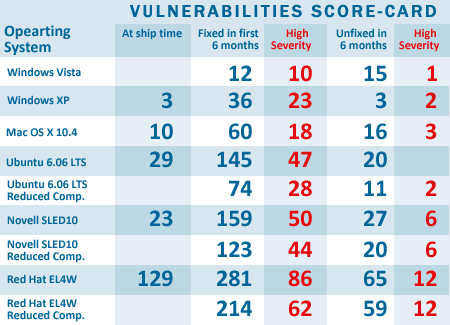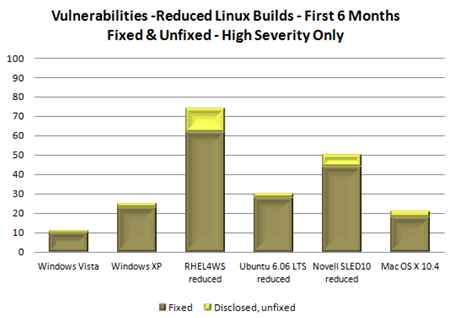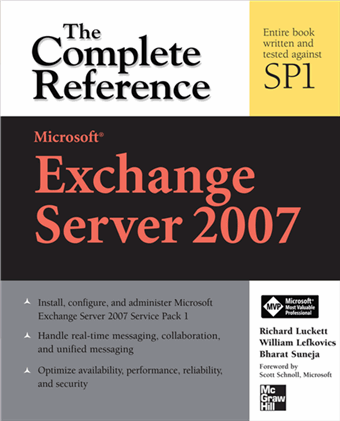I've been an avid reader of InfoWorld for as long as I can remember. It is one of the finest trade publications out there. In case you've missed it, they've been running an online campaign to "save Windows XP". A few weeks ago, they announced that 75,000 XP users had signed up for it (Read "
75,000 demand Microsoft keep Windows XP going"). If you look at the numbers, it's a tiny fraction of the overall number of Windows XP users.
Update: The
last update from InfoWorld is dated Feb. 28th- the number reported is 97,280.
InfoWorld says its readers want Microsoft to keep selling and supporting Windows XP indefinitely. Given that Windows XP was released back in 2001 - almost 7 years ago, is Microsoft wrong in ending support for a product that has certainly lived past its shelf life? If you work in the software industry, dealing with today's rapid-fire software releases, it's hard to imagine supporting something that old!
From
Save Windows XP! The clock is ticking:
Millions of us have grown comfortable with XP and don't see a need to change to Vista. It's like having a comfortable apartment that you've enjoyed coming home to for years, only to get an eviction notice. The thought of moving to a new place -- even with the stainless steel appliances, granite countertops, and maple cabinets (or is cherry in this year?) -- just doesn't sit right. Maybe it'll be more modern, but it will also cost more and likely not be as good a fit. And you don't have any other reason to move.
Reading the above, you get the impression that somehow Microsoft can and is actually forcing existing users of Windows XP to stop using that OS past June 30th, 2008. That is completely untrue! All Microsoft is saying is - this product has reached its end of life, and we will stop selling it by that date. It really has no impact on existing users who want to continue using it.
The fact is: your licensed copy of Windows XP doesn't come with an expiration date.
If you have an XP license today, or buy one by that date, you can install it on any computer you buy two, five, ten, or any number of years from now, provided the hardware is compatible. This does not apply to OEM licenses sold to computer manufacturers like Dell, HP, or Gateway - which are tied to the computer they ship with.
Microsoft's Windows Lifecycle Policy: Selling Windows, And Supporting It
Microsoft's Windows Life-Cycle Policy states that:
- Direct OEM and retail licenses will be sold till June 30th, 2008.
- System Builder licenses will be available till January 31st, 2009.
- The policy further states that "licenses will continue to be available through downgrade rights available in Volume Licensing programs after end of general availability".
Though Microsoft will stop selling Windows XP based on the above timeline, support for the operating system isn't going to end when that happens. Microsoft Support Lifecycle explains Microsoft's support policies, including what mainstream and extended support mean. According to the Microsoft Support Lifecycle for Windows XP:
- Mainstream support will end on April 14th, 2009.
- Extended support will be available for five years from that date, till April 8th, 2014!
For a product with General Availability dating back to December 31, 2001, Windows XP doesn't seem like a product that's being retired prematurely.
On a second look, InfoWorld's case isn't so much for Windows XP, as it is against Windows Vista. Running alongside the Save Windows XP articles:
Why people hate Vista and
Time to dump Windows?.
Update: To be fair to InfoWorld, they've also recently published "
How to deploy Windows Vista".
A quick look at some of the arguments against Windows Vista:
Vista a resource hog? Yes, Windows Vista requires more resources - and the last time I looked around, today's PC hardware was more than adequately equipped for Vista. Most decently-configured laptops, including the entry-level ones that sell for way under a thousand bucks, ship with dual-core processors and 2 Gigs of RAM. And under a thousand bucks get you what can be considered a state-of-the-art quad-core desktop with 3-4 gigs of RAM. In fact, a few weeks ago I was pleasantly surprised by the price of 4 Gigs of RAM for my laptop - $79!
Vista isn't designed to run on yesterday's hardware, and there's no reason for Microsoft to be apologetic about it. It's the same hardware + OS + apps purchase cycles we've been used to for a long time now. What do you want to buy the next time your three or five-year-old computer
dies, or you simply get fed up with it and want something new? Do you look for a single-core Pentium 4 processor that can run Windows XP well - assuming you can find one?
(As a sidenote, I'm writing this on a single-core Pentium 4 box running Windows Vista, and doing fine, thank you! I also had a 400-Mhz (yes, Mhz... ) PIII box with all of 256 Mb RAM running Windows Server 2003, AD, and Exchange Server 2003 for years, till it died last year.)It's the same cycle as buying microwaves or vacuum cleaners - they get old, stop working, or simply get in the way and impair users' productivity. When that happens, you go out and buy a new one, generally in the same price range or perhaps a little cheaper, but something that has all
(or most of) the bells and whistles - the right stickers, logos, and
features that a contemporary microwave or vacuum cleaner would have.
PCs are no different. In fact, thanks to Murphy's Law and the underlying technology breakthroughs, we generally get a lot more bang for our buck with every upgrade cycle.
If your microwave/vacuum cleaner/PC isn't broken yet
(or more importantly, if you aren't fed up with it, and it isn't getting in your way), there's really no reason to buy a new one. Unless you like buying new computers every couple of years, or sooner, and can afford to do so.
Drivers: Yes, drivers. Somehow Microsoft is to blame for the perceived lack of drivers. Personally, I haven't come across any piece of hardware recently - a display card, printer, or other peripheral that does not sport a driver for Windows Vista, or otherwise caused any compatibility issues. For most part, everything works out of the box.
Security: Security, you say. Seems like Windows Vista has proved its credentials on that front. Agreed,
UAC can be a little annoying at times, and gives Apple a great
talking point for its commercials, but that doesn't take away from the fact that Vista is a much more secure OS than Windows XP ever was. In fact, Vista does very well on this front compared to other OSes, including Apple's. Read previous post about the 6-month vulnerability report "
Numbers talk: Vista most secure OS of all?", or grab the more current
one-year vulnerability report.
User Account Control
It is easy to criticize the UAC feature without getting a good understanding of what it does and the problem it's intended to solve for IT departments. After years of extolling the virtues of not logging on using an account with administrator privileges for day-to-day stuff, I love UAC! It ensures administrator privileges are not available to your session all the time - even if you're logged in as an administrator. Not only does this protect computers from malicious code, it also protects users from themselves. When you do need to perform a task that requires administrator privileges, you are prompted for it.
Security has a cost - often measured in user inconvenience. Many security products and features come with some inconvenience to users. The argument shouldn't be about whether to have UAC, but about the ability to fine-tune it to an organization's security requirements. Arguably, this could be refined further to allow more granular control, but being aware of the options already available, including the ability to turn it off using Group or Local Policies helps.
The following graph from the one-year vulnerability report shows vulnerabilities found in Windows Vista, Windows XP, Red Hat Linux, Ubuntu, and OS X in the first year of release. It's clear what the numbers reveal, though many of us often tend to get more influenced by anecdotal evidence- particularly in this context.
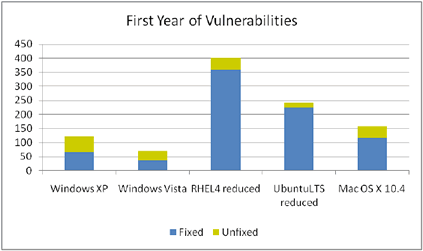 Figure 1: Vulnerabilities found in Windows Vista in the first year of its release compared to other operating systemsVista is slow:
Figure 1: Vulnerabilities found in Windows Vista in the first year of its release compared to other operating systemsVista is slow: One of the more common arguments against Vista,
slow is a relative term. Slow as compared to what? Running on the same hardware as my Windows XP computer, performing the same tasks, I haven't noticed this
slowness. If you benchmark performance results, Vista can be proven to be slower than anything. The questions to ask: - When was the test conducted? What version of Vista? What kind of hardware? What kind of applications? And more importantly, how slow was it really?
Yes, you may lose a few percentage points in performance, but there are gains in usability and new features.
I wouldn't blame InfoWorld for wanting to ride the "Bash Vista" bandwagon - it's fashionable to do so. To our relief, there are some saner voices out there. Like InfoWorld's own columnist, J. Peter Bruzzese. Peter writes in his Enterprise Windows column - titled "
Save XP? Why bother?":
The fact of the matter is, Vista is incredible. I've been working with it since Beta 3, and I won't return to that cartoon-looking XP for anything. Not only is it more secure than XP, it includes a host of invaluable new tools and applications (more on those in a bit).
Yes, Vista is more resource-intensive than XP. Yes, upgrading from XP to Vista requires putting some cash on the table. But Vista beats XP hands down, and the Save XP campaign amounts to unfairly criticizing Microsoft for adhering to a core capitalist practice: retiring an old product to sell newer, better ones.
That "yucky Windows"
My 4-year old son agrees with Peter's assessment about XP. For the few days that I had a loaner Media Center PC running Vista, not only did the little one get quite comfortable with it, he fell in love with it. When it was time to get my XP Media Center PC back from repairs, there were angry protests about having to deal with the "yucky Windows" (that would be XP!) that one doesn't ordinarily associate with someone his age.
Though a lot of it has to do with the aesthetics - the "X button that glows" when he wants to close a window and Gadgets that expand his vocabulary - isn't the UI and usability a big reason why we choose to use Windows and the exact topic Apple can't stop talking about when it comes to OS X?
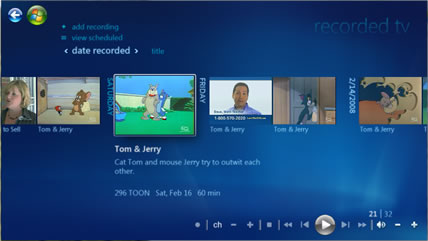
Figure 2: Windows Vista's Media Center interface
I finally upgraded the box - the last one I had with Windows XP, to Windows Vista on the last day of 2007. The delay was in large part because of the vendor - name withheld, mislabeled the TV tuner driver, causing a lot of confusion amongst its customers.
As a sidenote to this sidenote, Media Center is probably the most mission-critical app of all, as far as end-users/home users are concerned... an email outage at work is probably something you can survive and live to tell the tale. A "TV outage" at home is an event unmatched in its criticality, perhaps deserving a designation higher than P1/S1.
What kind of supporters is InfoWorld touting with its Save XP campaign? Let's turn again to Peter's column:
If you read a lot of the comments that people have been adding on the Save XP pages, you might note that an awful lot of people say, "Go to Linux," or "That's why I use Linux." You know, I've never heard a Mac user complain about Apple or their Mac, nor a Linux user complain about Red Hat or whatever version they are using. That's not to say they don't have problems; they just keep the discussion among themselves. But they are having a field day watching Microsoft users fight each other. Ever think they're the ones stirring up this whole Save XP campaign?
Come on InfoWorld, it's time to give up the skepticism, and that childish campaign. Users are moving to and using Windows Vista, and that will only accelerate going forward, now that SP1 is here. Users and organizations who want to continue using Windows XP can take their own time to upgrade - Windows XP will still be available for the foreseeable future, and supported for a much longer period
(as stated in Microsoft's product lifecycle policies referenced in this post).
Labels: Microsoft, Newsbytes, Security, Vista

 Exchangepedia Blog is read by visitors from all 50 US States and 150 countries world-wide
Exchangepedia Blog is read by visitors from all 50 US States and 150 countries world-wide




